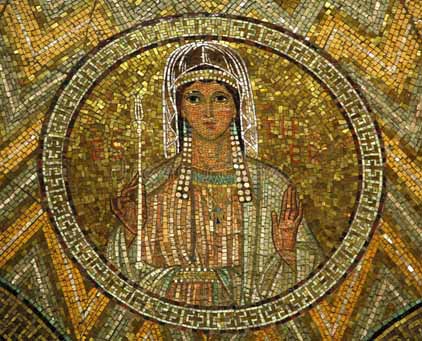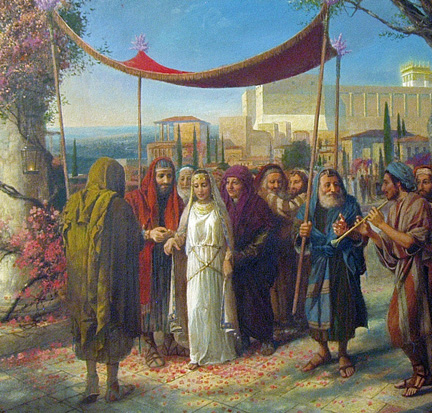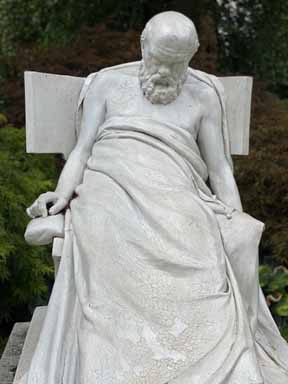August 2021
|
| |
|
Luther’s Spice
Martin Luther argued that John 16:33 was “the chief and
foremost passage in all Holy Scripture” (Luther’s
Works
5:18). In it Jesus says – “In the world you have
tribulation; but be of good cheer, I have overcome the
world.” From this we first learn that “whoever wants the
grace of God must have it spiced with the wrathful
madness of the world, Satan and his own flesh” (LW
28:220).
Then Luther goes on to note how Jesus overcomes the
world and what difference that makes. He does so not by
taking away “the danger, but by [our] hearts being
[made] unafraid.” This happens when we’re “inwardly
changed” and no longer care if our enemies “are still
raging” (LW
77:127). Then we “renounce this world and await the
kingdom of heaven” (LW
59:269). That’s because the death and resurrection of
Jesus, when believed, gives our hearts “a good standing
with God and [makes us] certain of His grace and of
eternal life” (LW
77:357). So if God can “nourish Christ for forty days
without any food, then He can also nourish His
Christians” with this promise of eternal life (LW
76:367). “External things come and go. Therefore, Christ
must be painted before the eyes of the heart so that we
look not to ourselves but only to Him who stands in our
midst, so that you may be among the disciples who forget
their fear and look to Christ alone and hear Him
speaking alone” (LW
69:342). For Christ’s words are “much greater” than any
of those external things that come and go (LW
68:263). “What else do I need, if I possess God’s Son?”
(LW
58:183). Amen!
‒Pastor
Marshall
|
|

Esther 4:14
by Pastor Marshall
The Book of Esther has been in the news: “I call it
Esther 4:14: God made me for such a time like this,
Adams said on CBS” (“Garcia and Wiley Concede in New
York City Mayoral Primary,” The Seattle Times,
July 8, 2021).
But maybe that verse isn’t about how people win
political campaigns. Maybe it’s about this instead:
“Esther’s choice is… one between death and death: a
death defined by courage and a willingness to sacrifice
on behalf of others, or a death defined by numbness and
withdrawal. Only one path – the path of risk – offers
deep satisfaction and real life” (Mike Cooper, Faith
Among the Faithless: Learning From Esther How to Live in
a World Gone Mad, 2018, p. 126). I think Cooper is
right about Esther 4:14.
So while I’m grateful to Eric L. Adams, former
NYPD police captain, member of the NY State Senate, and
Brooklyn borough president, for raising up Esther 4:14,
I disagree with the point he seems to be making by
bringing it up.
|
|

Luther on Ruth
by Pastor Marshall
Martin Luther saw great significance in Ruth 4:13 – “So
Boaz took Ruth and she became his wife.” Why? Because
while Boaz was a Jew (Ruth 2:1), Ruth was a non-Jew, a
foreigner, a Moabite (Ruth 1:4) – or, in Luther’s words,
“the idolatrous Ruth” (Luther’s
Works 7:201). Why is this important? It proves that
the Jews are not of pure stock – for even “Abraham
himself was a godless man” and “married Sarah of Ur of
the Chaldeans, a wicked and godless city of the
Babylonians” (LW
7:199).
Luther goes on to say that this fact “should be
opposed to the pride of the Jews, in order that they may
know that they despise the heathen unjustly…. God
regarded heathen women so highly in order that He might
testify that He has not cast off the heathen nations as
accursed, as the Jews… execrate them…. But Christ our
Lord wanted to be born from the blood of various
nations” (LW
7:200–201). Even so, the heathen are not fine just as
they are. We learn this from Joseph when he married the
godless woman, Asenath (Genesis 41:45). Although she was
“not yet imbued with the pure knowledge of godliness,
Joseph… later taught her about the worship and
invocation of the true God” (LW
7:200). Therefore, conversion matters more than origin
of birth. So when Ruth converts to Judaism (Ruth 1:16),
that’s more important to Luther than that she was born a
Moabite.
|
|
| |
|
PRESIDENT'S REPORT....by
Cary Natiello
Dear Friends in Christ,
God willing, by the time you receive this we will have
conducted five indoor worship services.
Things have been going well.
We are singing hymns and receiving communion.
As before, there are still members not yet
comfortable returning to an indoor setting, so Pastor
Marshall will continue to put the service on-line
(flcws.org), as well as continue home communion
distribution.
FLCWS HEALTH & SAFETY PROTOCOL UPDATES
Based on our experience, we have been able to make some
adjustments to our safety protocols.
At the July 13, council meeting we discussed
making changes to our safe opening guidelines.
Some things were changed, and some were not.
1)
Masks are still required,
per usual.
2)
Temperatures will still be taken of each person entering
the church.
3)
RSVP’s are no longer required.
We believe we can identify/recall who was at a service,
but if someone
arrives who we are not familiar with, we will still
collect their contact information in case we need
to contact them about a COVID-19 report at the service.
4)
We will no
longer require assigned seats. Seating will
be open for attendees, but social distancing is still
required. More
use of the seats along the walls may be necessary.
The ushers will ask families to separate a little bit
more if they are too close to another family.
5)
The new limit
for attendance is 50, not including staff.
Ushers will
monitor the attendance and announce when we have reached
capacity.
6)
There will now be two
people at a time allowed up to the front for communion.
Children accompanied by parents are an exception to the
2 maximum. Ushers will release people in a
systematic order and control the flow.
There still is
no kneeling at the rail.
WHAT’S TO COME?
Looking ahead, we will continue to monitor our services,
attendance, and protocols and make changes as determined
safe and appropriate.
We are planning a phased-in approach to get back
to “normal”.
A possible order of things to come could look
like this:
1)
Resume the 8:00 a.m. spoken worship service.
2)
Resume the Sunday morning Bible class, and other classes
offered by Pastor Marshall, although, some of these may
continue to be conducted via ZOOM.
3)
Resume the Wednesday and other worship services.
4)
Resume the Sacrament of Penance.
We will keep you informed of any changes to our monthly
calendar.
NEW COVID-19 DEVELOPMENTS
At a time when we are resuming indoor services, the
death rate from COVID-19 in the U.S. is rising.
Dr. Rochelle Walensky, the CDC's director, said
at a briefing of the White House COVID-19 Response Team
that, “this is becoming a pandemic of the unvaccinated
and the biggest concern is we are going to continue to
see preventable cases, hospitalizations and sadly deaths
among the unvaccinated.”
Reports are that the upward trend in national
statistics is being driven almost entirely by outbreaks
in places with low vaccination rates, such as the
Ozarks, Florida and parts of the Mountain West.
Some counties in Missouri and Arkansas, are
recording more cases now than they did during the
winter.
King County on the other hand continues to remain in
acceptable statistical territory.
Even so, we had an uptick in our numbers since we
hit a low in June.
On 6/28/21 we were at only 17.4 new cases per
100,000 King County residents.
On 7/14/21 that number increased to 38.3.
But based on the most recent, albeit incomplete,
data being reported, King County’s numbers are heading
back down once again.
Let’s pray that the downward trend will continue
and be sustained.
EXTENDED MINISTRIES
To date, through June, the church and our congregation
have given over $27,000 in gifts to our extended
ministries, but there are still many people in our area
who continue to struggle to meet the basics of living.
Some organizations that continue to need our help
and are part of our extended ministries are:
Foss Home (ELCA), Operation Nightwatch, Mary's
Place, and Welcome Table.
If you would like to learn more about any of
these organizations, please contact Pastor Marshall.
Thank you to those in our congregation who are
able to offer some additional support to local community
organizations that are dedicated to helping others on a
daily basis.
MAJOR MAINTENANCE PROJECTS
We are continuing to evaluate options for implementing a
long-term plan for replacing our windows and redoing the
building roof.
These are very expensive projects and it is
taking time to identify how best to proceed.
Our goals for the windows are to install new
long-lasting low maintenance windows, maintain the
beautiful building aesthetics, not cut any corners, and
get all this from a reputable experienced company for an
affordable price.
Not an easy task.
Hopefully, we can find a way to meet all our
goals in the months ahead.
I hope you are all staying healthy and safe, and that
you are able resume more activities that you once
enjoyed.
|
|
| |
|
ANNOUNCEMENTS:
Pastor Marshall’s
Summer Bible Studies:
The Wednesday Bible Study is 1st John, at 7 pm.
Thursday Evening Bible Study
7 pm,
is
a study on Proverbs.
“WITH
THE MIND”
book club (Hidden
Valley Road
by Robert Kolker , 2020)
is planned for Sunday, August 29th, 3:30 pm. All of
these classes are via ZOOM, please contact him so he can
send you a link, then you can join in on them.
Home Communion
is still available for those who cannot attend church.
Online Worship
continues each Sunday on our web page flcws.org. And
the next Zoom
Koran
class will be (September 13, 20, 27, October 4).
Please note:
Last month’s
Monthly Home Bible Study
mistakenly reprinted the one for June.
The corrected version on Proverbs 21:1 is
available online or through the office.

A statue of
Socrates
in Parco Ciani, Lugano, Italy. Pastor Marshall’s high
school friend, Dr. Mark Bertness, sent the photo in because the
statue reminded him of Ron.
|

|
Romans 14.8
Monthly Home Bible Study,
August 2021, Number 342
The Reverend Ronald F. Marshall
Along with our other regular study of Scripture, let us
join as a congregation in this home study. We will
study alone
then talk informally about the assigned verses together
as we have opportunity. In this way we can “gather
together
around the Word” even though physically we will not be
getting together (Acts 13.44). (This study uses the RSV
translation.)
We need to support each other in this difficult
project. In 1851 Kierkegaard wrote that the Bible is “an
extremely dangerous book.... [because] it is an
imperious book... – it takes the whole man and may
suddenly and radically change... life on a prodigious
scale” (For
Self-Examination). And in 1967 Thomas Merton wrote
that “we all instinctively know that it is dangerous to
become involved in the Bible” (Opening
the Bible). Indeed this word “kills” us (Hosea 6.5)
because we are “a rebellious people” (Isaiah 30.9)! As
Lutherans, however, we are still to “abide in the womb
of the Word” (Luther's
Works 17.93) by constantly “ruminating on the Word”
(LW 30.219)
so that we may “become like the Word” (LW
29.155) by thinking “in the way Scripture does” (LW
25.261). Before you study then, pray: “Blessed Lord, who
caused all Holy Scriptures to be written for our
learning: Grant us so to hear them, read, mark, learn
and inwardly digest them, that we may embrace and ever
hold fast the blessed hope of everlasting life, which
you have given us in Our Savior Jesus Christ. Amen”
(quoted in R. F. Marshall,
Making A New
World: How Lutherans Read the Bible, 2003, p. 12).
And don’t give up, for as Luther said, we “have in
Scripture enough to study for all eternity” (LW
75:422)!
Week I.
Read Romans 14.8 noting the line
we are the Lord’s.
What’s that like? On this read John 10.29 noting the
line no one is
able to snatch them out of the Father’s hand. What
guarantees that? Martin Luther believed it held as long
as we don’t abandon Christ by running after new ideas (Luther’s
Works 28:366). So as long as we are
content in
Christ we are safe (Philippians 4:11). What secures that
contentment? Read Colossians 1.13 noting the words
delivered and
transferred.
What happens then? Read James 1.21 noting the word
implanted.
What’s that like? Check out the phrase
dwell in you
richly in Colossians 3.16. Note also the phrase
rule in your
hearts in Colossians 3.15. Add to this the line
the love of
Christ controls us because we are convinced in 2
Corinthians 5.14. These solid verses explain the
strength of the Father’s hand. Is there an example of
this? Read Acts 9.22 about the converted Paul who
increased all the
more in strength and confounded his critics. No
wobbling around here. Was the word implanted in him? How
so?
Week II.
Read again Romans 14.8 noting the line
if we live, we live to the Lord. What’s that about?
On this read Revelation 3.16 about being
lukewarm. Why
is that criticized? Read about
drifting
away in
Hebrews 2.1; that
shipwreck in 1 Timothy 1.19, and
falling away
and choking
in Matthew 13.21–22. When we’re lukewarm these three
verses kick in. Do you agree? What then replaces being
lukewarm? Read 2 Corinthians 10.5 noting the line
taking every
thought captive to obey Christ. That’s what it is
like to live to
the Lord. Do you agree? On this read Galatians 2.20
noting the line
it is no longer I who live, but Christ who lives in me.
Is that the new
creation in 2 Corinthians 5.17? Ephesians 4.14 warns
about being
tossed to and fro and carried about with every wind of
doctrine – but that new creation would not allow for
this. Why? Is it that the
eternal weight of
glory in 2 Corinthians 4.17 is too heavy to be
knocked around in this way? If so, why?
Week III.
Reread Romans 14.8 noting this time the line
if we die, we die to the Lord. What is that like? On
this read John 11.25–26 noting the line
though he die,
yet shall he live, and… never die. Does that mean
that death isn’t real? Check out 2 Corinthians 4.14
noting the line
he who raised the Lord Jesus will raise us also with
Jesus and bring us… into his presence. That line
only breaks the permanence of death – instead of denying
it. How will that restoring of life happen? On this read
1 Corinthians 15.53 noting the verb
putting on
immortality and imperishability. But also note 1
Corinthians 15.50 and the phrase
cannot inherit.
Does the second verse block the putting on in the first
verse? On this read John 5.26 noting the line
has life in
himself. This explains why we can’t overturn our own
death even though God can. Therefore we can put on what
we cannot inherit on our own. Do you believe that? Why
or why not?
Week IV.
Read Romans 14.8 one last time noting the line
we are the Lord’s.
Does that line also mean that death cannot separate us
from God? What would that be like? On this read 2
Thessalonians 1.9 noting the
correlation
between
punishment and
exclusion from
the presence of the Lord. Against this verse read
Romans 8.39 noting the line that nothing
in all creation
will be able to separate us from the love of God in
Christ Jesus
our Lord. So Christ’s love for us keeps us close to
God – even, according
to Romans 8.35–36 – when death strikes. How does his
love do that?
Check out Hebrews 2.14 noting how the
death of
Jesus destroys the power of death. In what way? His
death destroyed the cause of death – which Roman 6.23
says is sin.
How does his death do that? 1 Peter 2.24 says that Jesus
bore our sins in
his body on the cross. That suffering paid the
penalty for sins so that sins no longer can cause death.
Does that explain the phrase
put away sin
in Hebrews 9.26? If so, how so?
|
|
Treasury of Prayer
Heavenly Father, make the door of your church wide
enough to receive all who need love and fellowship, and
your tender care; but narrow enough to shut out all
envy, pride and hate. In your mercy make it a gateway to
your eternal kingdom. In the name of Jesus I pray. Amen.
[For All the Saints III: 1273, altered]
|
|

Philippians
The Apostle Saint Paul
“I have learned, in whatever
state I am, to be content.”
(4:11)
by Pastor Marshall
Martin Luther believed that this
verse was about being “cheered by hope” and not becoming
“discouraged in adverse circumstances,” but also “when
everything is serene” neither becoming exalted and
“arrogant” either. This happens because God permits his
saints “to sink so deeply in perils that they appear
lost. Yet in the end they are delivered in a wonderful
manner. Thus when the entire world is condemned, we who
confess Christ and put our trust in His death will be
saved like remnants.” So “when we are in a trial we may
be strong, but when we are not in a trial we may be
humble and grateful” (Luther’s
Works 2:370). This is what Christian contentment is
based upon. “Thus we learn to show patience in
adversity, to trust in God’s goodness, and to hope for
salvation, but in prosperity to humble ourselves and
give the glory to God. For it is His custom to do both:
to bring down to hell and to bring back, to afflict and
to comfort, to kill and to make alive. This is the game,
with its continual changes, that He plays with His
saints. For there is no perfect joy in this life, as
there will be in the life to come. Sometimes, like an
angry father, He inflicts punishments; sometimes, like
an affectionate father, He fosters and comforts His
children” (LW
2:369–70). Living according to this divine game is what
it’s like “to have the spirit of Christ” dwelling within
you (LW
27:403).
In all of this we must
remember that “Christ does not want to urge continual…
sorrow. He wants to warn against those who seek to
escape all mourning and to have nothing but fun and have
their comfort here. And He wants to teach His
Christians, when things go badly for them,… to know that
it is God’s good pleasure and to make it theirs as well,
not to curse or rage or despair as though their God did
not want to be gracious. When this happens, the bitter
draft should be… made milder with honey and sugar….
Therefore say good-bye to the world and to all those who
harm us…. And let us… be joyful in the name of God and
Christ…. We shall live to see that at the last [the
worldly] will have to howl and weep when we are
comforted and happy” (LW
21:22).
None of this comes “through
heroism” on our part (Karl Barth,
Epistle to the Philippians, 40th Anniversary Edition, trans. J. W.
Leitch, 2002, p. 127). No, it’s rather “a matter of
teaching, exercise and care…. It’s not a matter that’s
easily effected but one that’s exceedingly difficult and
new” (John Chrysostom,
Homilies on
Philippians, trans. P. Allen, 2013, p. 301). And so
“neither [our] serenity nor [our] rejoicing is a matter
of self-reliance” (George Hunsinger,
Philippians, 2020, p. 161). Even though this may all come off
poorly, sounding “tense, detached, awkward, distant, and
discourteous” – it’s only meant to show that Christians
are neither “defined… by wealth nor poverty but by a
contentment that transcends both and by a power in
Christ which enables [the Christian] to live in any
circumstance” (Fred Craddock.
Philippians,
1985, pp. 76, 78). That’s because even though we endure
“difficult circumstances, it is ultimately for the good”
(Bonnie B. Thurston,
Philippians,
2009, p. 157). So being content “with what you have
(Hebrews 13:5) seems to have been a general precept in
the early church. This attitude is the opposite of
covetousness, against which both Jesus (Luke 12:15) and
his disciples uttered solemn warnings, describing a
‘greedy person’ as ‘an idolater’ (Ephesians 5:5)” (F. F.
Bruce, Philippians,
1989, p. 150). It’s not surprising then that Philippians
4:11 doesn’t stand alone in the New Testament. “Second
Corinthians 4:8–9 is most similar [to it] – ‘afflicted
in every way but not crushed; perplexed, but not driven
to despair; persecuted, but not forsaken; struck down,
but not destroyed.’ Faith endures such situations and
will triumph (Romans 8:35–39)…. In the divine scheme of
things, [we have] a path ‘to the stars, through
perseverance’ [ad astra per aspera],” which is also the “motto of the state of
Kansas and the British Royal Air Force. The Russian
dissident Andrei Sakharov printed them on the door of
his study during exile in Gorky”(John Reumann,
Philippians,
2008, p. 702). Amazing how this wisdom has spread!
|
|
|
